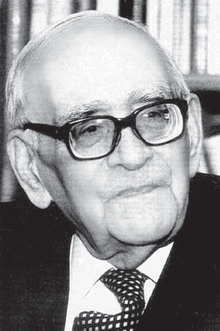Mahmoud Hessabi
Mahmoud Hessabi | |
|---|---|
 Mahmoud Hessabi | |
| Minister of Culture and Higher Education | |
| In office 6 May 1951 – 16 July 1952 | |
| Prime Minister | Mohammad Mosaddegh |
| Preceded by | Karim Sanjabi |
| Succeeded by | Mehdi Azar |
| Senator from Tehran | |
| In office 22 January 1950 – 9 May 1961 | |
| Appointed by | Mohammad Reza Pahlavi |
| Personal details | |
| Born | 23 February 1903 Tehran, Qajar Iran |
| Died | 3 September 1992 (aged 89) Geneva, Switzerland |
| Resting place | Tafresh, Iran |
| Alma mater | American University of Beirut, Sorbonne, École Superieure d'Electricité |
| Occupation | scientist |
Mahmoud Hessabi (or Hessaby, Persian: محمود حسابی, 23 February 1903 – 3 September 1992) was an Iranian nuclear physicist and senator.[1] He was the minister of education in the cabinet of Prime Minister Mohammad Mosaddegh from 1951 to 1952.[2]
Life
[edit]Hessabi was born in Tehran to the family of Abbas and Goharshad Hessabi. His family's hometown is Tafresh, Markazi province, Iran.[3] His family moved to Beirut in 1907 when his father was appointed consul at the Iranian embassy.[4] There Hessabi attended primary school. He was still in secondary school when World War I started prompting the closure of his school; Hessabi continued his education at home and in 1922, he earned a degree in road engineering from the American University of Beirut. After briefly working for the Ministry of Roads, Beirut, Hessabi travelled to Paris for further education, he was awarded a degree in electrical engineering at the École Superieure d'Electricité and later a doctorate degree in 1927. In Paris, he worked with Aime Cotton.[5]
In Tehran, Hessabi was affiliated with the University of Tehran and organized the science and engineering faculties of the university; He was teacher of Alenush Terian while she studied at the university.[6] In June 1951, Hessabi was appointed to a three-man provincial board of the Iranian oil company, the designated successor of the Anglo-Iranian Oil Company. In December 1951, he replaced Karim Sanjaby as minister of education.[1] Between 1961 and 1969, Hessabi was Iran's representative on the Scientific and Technical Subcommittee of the United Nations Committee on the Peaceful Uses of Outer Space.
Museum
[edit]In 1992 his house changed to a museum to for recognition of his life. The Mahmoud Hessabi museum is located Tajrish neighborhood in Tehran.
Selected works
[edit]- Hessaby M. (1947). "Continuous Particles". Proceedings of the National Academy of Sciences of the United States of America. 33 (6): 189–194. Bibcode:1947PNAS...33..189H. doi:10.1073/pnas.33.6.189. PMC 1079021. PMID 16588741.
- Hessaby M. (May 1948). "Theoretical Evidence for the Existence of a Light-Charged Particle of Mass Greater than That of the Electron". Phys. Rev. 73 (9=): 1128. Bibcode:1948PhRv...73.1128H. doi:10.1103/PhysRev.73.1128.
See also
[edit]- Mahmoud Hessabi museum
- Physics Society of Iran
- List of contemporary Iranian scientists, scholars, and engineers
- List of Iranian senators
- Markazi province
References
[edit]- ^ a b "Iran Bank Fights Drain on Exchange: Opening of Credit Abroad for Imports Suspended in Step to Protect Currency". The New York Times. New York. 5 December 1951.
- ^ Alexander, Yonah; Nanes, Allan S. (1980). The United States and Iran: A Documentary History. Aletheia Books. p. 244. ISBN 9780890933787.
- ^ "Iranian Personalities: Professor Mahmoud Hessabi". Iran Chamber Society.
- ^ H. E. Chehabi; Hassan I. Mneimneh (2007). "Five Centuries of Lebanese–Iranian Encounters". In H. E. Chehabi (ed.). Distant Relations: Iran and Lebanon in the Last 500 Years. New York: I.B. Tauris. p. 18. ISBN 9781860645617.
- ^ Tarikhi, Parviz (2014). The Iranian Space Endeavor: Ambitions and Reality. Springer. p. 47.
- ^ Talebian, Mohammad; Talebian, Ehsan (2012). "Alenush Terian: The Iranian Solar Mother". Physics in Perspective. 14 (2): 239–241. Bibcode:2012PhP....14..239T. doi:10.1007/s00016-012-0085-x. S2CID 120601020.
External links
[edit]- Hessaby Foundation
 Media related to Mahmoud Hessabi at Wikimedia Commons
Media related to Mahmoud Hessabi at Wikimedia Commons
- 1903 births
- 1992 deaths
- Scientists from Tehran
- University of Paris alumni
- American University of Beirut alumni
- Government ministers of Iran
- 20th-century Iranian physicists
- Members of the Academy of Persian Language and Literature
- People from Tafresh
- Members of the Senate of Iran
- Recipients of the Legion of Honour
- 20th-century Iranian engineers
